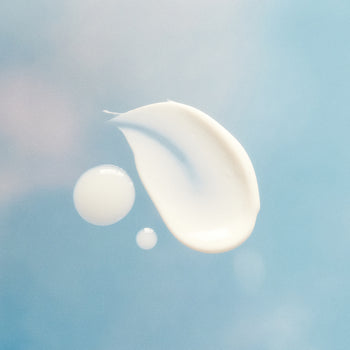
Is Your Skin Sensitive, Sensitized or Both?
Before conference calls and HD selfies we had a level of silent bliss when it came to our reflections. Barring mirrors, windows and placid bodies of water, there were less opportunities to fixate on our faces.
When the pandemic hit, “at home peels” and The Ordinary’s infamous blood red peel, their AHA 30% and BHA 2% peeling solution was listed as a “breakout term” on Google.
Another breakout search term that started to emerge a few months later? Skin barrier. While it may just be a coincidence that people started searching about “skin barriers” after the rise of at home peels… here’s how to tell if your skin is sensitive or if you sensitized your skin.
AKA, compromised your skin barrier.
What is your skin barrier?
Your skin is made of multiple layers; the subcutaneous fat layer, the dermis (where all your collagen and elastin are) and the epidermis; your outermost layer.
The epidermis has five layers, the last and outermost layer is the stratum corneum or “horny” layer.
We aren’t done talking about layers. The stratum corneum contains layers of interlocking proteins and lipids that protect you from the outside world.
The stratum corneum is your physical barrier to disease, pathogens, and irritation. Ever hear someone say you need to “get rid of dead skin cells.”
There is an absolute limit; you need dead skin to glow.
The stratum corneum also contains the acid mantle which also is part of the skin barrier. The barrier has a slightly acidic pH, ranging between 4.5 and 5.5, and is key to neutralizing pathogens, or disease-causing bacteria like staph infections.
Some people are genetically predisposed to a weaker stratum corneum or acid mantle; this can lead to sensitive skin.
Or. You’re too enthusiastic with the skincare. This is sensitized skin.
The important thing to remember is you need dead skin to avoid dehydrating and to protect your deeper underlying tissues.
What happens if you mess with your barrier?
The easiest way to think of this is your lips which by nature, don’t have sebaceous glands (oil glands which lubricate and protect the skin) and is thinner skin. Imagine licking your lips all day, then using a scrub on them and never once moisturizing or using any balm… they’d burn and feel raw by the end of the day.
This is similar to what happens when you use a bunch of exfoliants or go out on a very windy day without protecting your skin. Either from the elements or from skincare, you can damage and wear down your barrier which manifests as irritated, red, flaky, tight, itchy and dry skin.
When you wear down or damage your barrier (whether it’s the acid mantle or the 15-30 layers in the stratum corneum), your skin is less apt at doing its job as a gatekeeper. This means more water evaporates from the deeper layers of your skin (called trans epidermal water loss) while irritants can more easily get in. The defenses of your skin have been breached.
So, is my skin sensitive or sensitized?
Inflammatory conditions like eczema and rosacea would be examples of skin that is sensitive, why? These are conditions that aren’t by user error in a routine or habit, it’s naturally how your skin is.
Both conditions stem from skin barrier dysfunctions with the inflammatory disease leading to an impaired skin barrier. What does this mean? You are more sensitive and reactive to skincare, naturally.
Another example of naturally sensitive skin? Skin that tends to be dry. Skin that lacks oil and lipids in those interlocking layers of the stratum corneum has poor defenses. This mean you naturally are prone to dehydrated skin due to the barrier not keeping water inside tissues and irritants can get past the skin more easily. This is why as we get older, our skin can become more sensitive.
Sensitized skin is something that’s self-inflicted where you don’t have a condition or a history of an inflammatory skin disease. A good example is you used a new exfoliator and your skin all of a sudden is itchy, red and dry; this is new to you, this is sensitized skin.
Common sensitizers in skincare
Ingredients tend to have a therapeutic window; too low of a dose and you won’t have much of a result, too high a dose and you’re getting into potential irritation central.
A good example is Vitamin C in the well-studied form of L-Ascorbic Acid, anything above 20% doesn’t appear to have great returns without irritation. Anything below 5-10% has little effect. If something is dosed very high when it doesn’t need to be for an effect or claim, this irritation and inflammation can lead to a break-down in your skin’s defenses.
Understanding therapeutic windows is important; more isn’t more!
The other common sensitizer in skincare are resurfacing ingredients. Chemical exfoliants like Glycolic Acid and Salicylic Acid (Lactic Acid, list goes on), enzymes like fruit enzymes that work as exfoliants and finally retinoids which increase cell turnover all impact the barrier leading to the potential for irritation.
What do I Dieux when my skin is irritated!
The easiest thing to do is less.
To prevent irritation, always introduce one product in at a time and make sure you aren’t duplicating ingredients. It’s important to pay attention to ingredients used as brands don’t always list exfoliating acids as hero ingredients so you may be doubling up on exfoliation or even retinoids without realizing.
If you have an inflammatory condition the best thing to do is go to a licensed professional and figure out what will work for you.
Ultimately, when your barrier is hurt you should treat it the way you do any wound; be gentle, protect it and be kind to yourself, mistakes and accidents happen.
You’re Dieux-ing Great
Sources:
https://www.ncbi.nlm.nih.gov/books/NBK513299/
https://web.archive.org/web/20110301151916/http://www.sebamed.com/fileadmin/user_upload/pdf/Studien/Saeuremantelkonzept/1.05.pdf
https://pubmed.ncbi.nlm.nih.gov/33852244/#:~:text=Abstract,%2C%20itching%2C%20and%20facial%20flushing.
https://www.ncbi.nlm.nih.gov/pmc/articles/PMC5911439/#:~:text=Atopic%20dermatitis%20(AD)%20is%20the,contribute%20to%20skin%20barrier%20defects.







